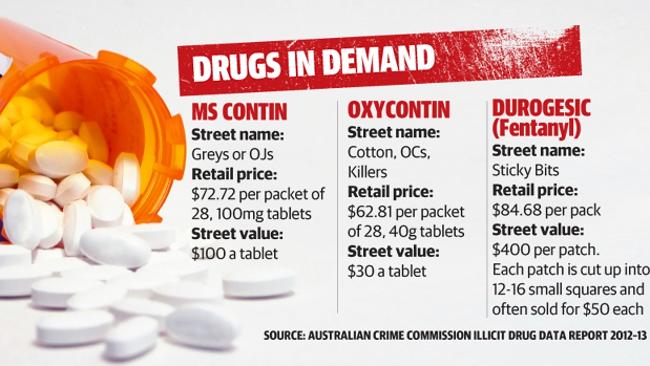
Drugs in demand. Source: CourierMail
CASH-strapped pensioners are selling their prescription medication to get by — with some raking in up to $4000 for a box of painkillers.
Doctors warn that dealers are also targeting vulnerable pensioners and even approaching them outside pharmacies.
The most desired drugs — which addicts and dealers distil and inject — are opioid pills MS Contin and OxyContin, and Fentanyl patches, often prescribed for chronic pain and cancer care.
Motivated by money, a single pensioner surviving on $766 a fortnight can make $4000 for a box of Fentanyl patches — known on the street as “Sticky Bits” — according to latest figures from the Australian Crime Commission.
And OxyContin tablets, dubbed “Hillbilly Heroin”, can be sold for $100.
A former addict told The Courier-Mail that a single Fentanyl patch about the size of a post-it note can be cut into 12 to 16 squares and sold for around $50 a square.
The addictive medications are considered cheaper and easier to get than heroin, which sells for $380 per gram in Queensland, according to the National Drug and Alcohol Research Centre.
In Queensland’s retirement capital of Hervey Bay, GP Dr Ken Treichel said he had banned six elderly patients from his surgery in the past year after finding they were selling their medication.

Dr Ken Treichl in his surgery, Hervey Bay.
“It’s absolutely rampant. It’s so much more than people are aware of,” Dr Treichel said. “I actually see people (selling). I’ve seen people walk up to them, bring the money out and do the deal, standing in the carpark.”
Dr Treichel said there was a black market for prescriptions pills and the problem was getting worse.
He said one patient burst into tears and spilt the beans when he became suspicious about the 78-year-old’s request for more pain medication.
“And he literally just started crying and told me the whole lot. He’d been approached by his son’s mate who told him he’d give him $1000 for half his script of painkillers,” he said, adding that word was spreading that struggling elderly — whom he described as “normal ma and pa patients from the suburbs” — could make quick cash.
“People know; they talk about it and know the old bloke up the street is getting paid this and, ‘Oh gee, I can get $500 and all I have to do is give you some tablets’,” he said.
Doctors say some cunning patients are even “doctor shopping” and obtaining several scripts from clinics in different towns, unknown to each doctor.
Prescription rates for opioid painkillers have soared in the past decade, with a national report warning illicit use is “widespread” and “often becoming more common than heroin”.

Prescription drugs being sold by the elderly.
Queensland Health maintains a prescription monitoring database and a hotline for doctors but the patient data can be months out of date.
The Australian Medical Association Queensland has called for a “real time” electronic reporting system to track prescriptions “as a matter of urgency”.
AMAQ president Dr Christian Rowan, an addiction medicine specialist, said it would enable doctors to see immediately if a patient was conning multiple doctors.
He said the targeting of vulnerable older people for their medication was a “real and known problem” which he said had been described as “fossil farming”.
The federally-funded Electronic Recording and Reporting of Controlled Drugs, which is operational (ERRCD), is not in use in Queensland as it is still being “assessed”.
Queensland Health figures show the prescription rate for oxycodone, including OxyContin, rose from 10,100 per 100,000 population to 18,057 per 100,000 population between 2009 and 2013. Fentanyl increased from 2334 per 100,000 to 3236 per 100,000 while morphine, including MS Contin, declined from 3494 per 100,000 to 2852 per 100,000.
Police figures show there were more than 1100 seizures of pharmaceuticals in the past year, with 35 per cent in the Brisbane region, 21 per cent in the southeast and 15 per cent in the central region.
Horror health budget delivered 0:57

National Health Editor Sue Dunlevy says the Government is only sugar coating the pill of bitter medicine with its medical research fund
- News Corp Australia
- 13 May 2014
- News/Politics
Drug and Serious Crime Group Sergeant Adam Frost said most pharmaceuticals were illegally sold by individuals or small networks. And he said “doctor shopping” was a problem for police.
Sgt Frost said people of all ages had been caught buying and selling drugs, including pensioners.
“It’s not an excuse — a 78-year-old on the pension and finding it tough might resort to that sort of supplementary income,” he said.
He said the illegal pharmaceutical market was growing and there needed to be a collaborative approach between health departments, non-government treatment services and the police.
“There is a need to maintain a watching brief on this issue, because where there is a demand for the illicit use of these drugs and opportunity for profit through illicit sales exists, organised crime is generally not too far behind.”
Dr Treichel (pictured right) said doctors were in a difficult position because they had to assume patients were being honest when claiming they needed pain medication.
“You believe the people are being honest with you and the story you’re getting is honest. And so we look culpable,” he said.
